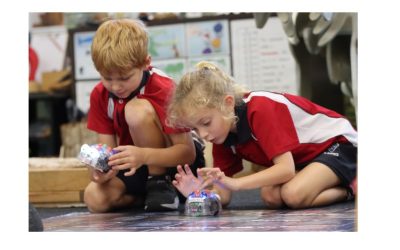Raising an independent child is important yet challenging. Here’s how you can nurture your child’s growing independence in the early years.
1. Trust their capabilities
Fostering a child’s independence begins with the belief that children are naturally competent learners with the ability to make decisions for themselves. Recently, at Sanctuary Early Learning Adventure’s Ashmore centre, the staff introduced drinking glasses into the toddler room. The glasses are on an open shelf and available for the children to use when they want a drink.
“We have 18-month olds that will go over, grab a glass and get the educator to help them pour the water in,” says Michelle Tuffley, Sanctuary Early Learning Adventure’s operations manager. “We trust the children enough that they’re going to hold the glass properly. We have 12 toddlers in that room and not one glass has been broken.”
2. Teach self-help activities
With a little bit of help, even very young children can learn how to undertake basic self-help activities. For example, children up to 18 months old can drink from a cup, pick up finger food and begin to use a spoon. Up to 36 months, children can wash their hands (with assistance), put dirty clothes in the hamper when asked, push and pull toys, and learn to use the toilet. Once they are three, children can brush their teeth (with help), put on shoes (without tying laces), put dishes in the sink and put rubbish in the bin.
3. Give choices
“For young children, everything is adult-directed,” Michelle points out. “Allowing children to make simple decisions about things, such as what they want to wear or what they want to eat, helps set them up for success later in life.”
Rather than asking your child open-ended questions, try giving them two or three specific options to choose from.
4. Practice mindfulness
Essential to encouraging young children’s independence is the parents’ and caregivers’ ability to be present and connect with a child in a meaningful way. “You’ll have the child’s full attention if they have your full attention,” says Michelle. “It’s really about slowing down and connecting with integrity. When we do that, we show children that they’re worthy and build their self-worth.”
5. Normalise failure
By teaching your child that mistakes are a normal part of the learning process, you help build their resilience. When it comes to the new drinking glasses in the Ashmore centre’s toddler room, for example, Michelle says any breakages will be dealt with safely and welcomed as valuable learning opportunities. “We need to allow children to make mistakes and be there to guide them to say, ‘You know what, that’s okay, I make mistakes sometimes too!’”
6. Tap into their interests
“We need to look at how each child learns best and how they express themselves creatively; we need to adapt ourselves, rather than children adapting to us,” explains Michelle. “Our educators look at a child’s strengths and interests, rather than weaknesses. To encourage a child’s independence, we identify something that they’re interested in and then intentionally introduce that concept in a way that the child learns.”
GOLD COAST
Ashmore
Mermaid Waters
Maudsland centre
SUNSHINE COAST
Buderim
By Sanctuary Early Learning Adventure
To find out more, call 1300 00 PLAY or visit www.sanctuarylearning.com.au
RELATED:
The importance of creativity and imagination
Maudsland is getting a new early learning centre … and it’s STUNNING!




